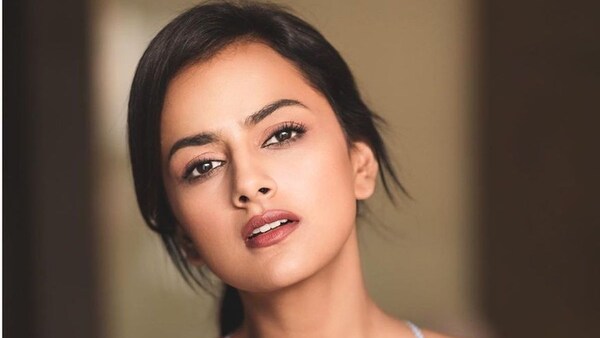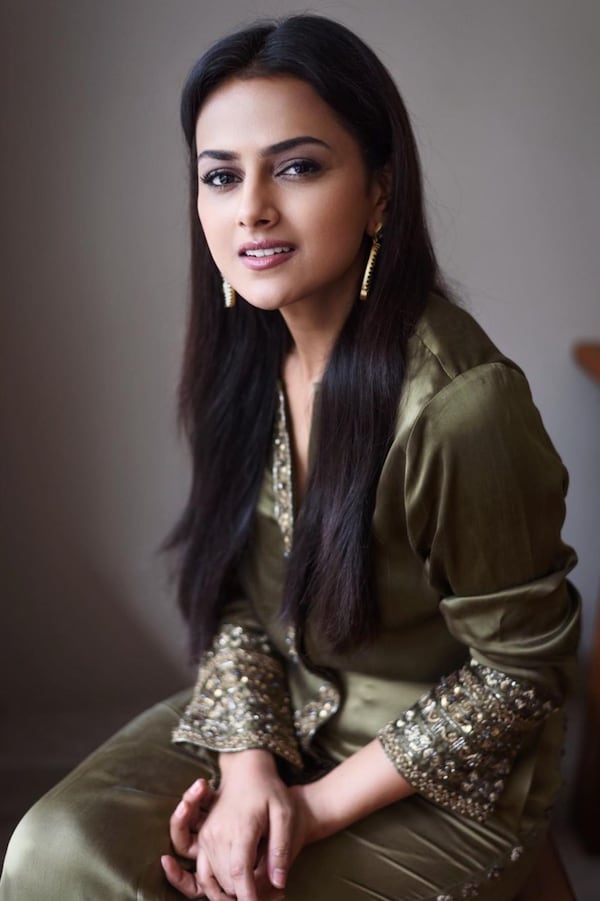Shraddha Srinath: Female-centric films that allow me to push the envelope as an actor are what I am looking for now
The Dear Vikram actress has a few exciting projects in Tamil cinema currently that fit right into her scheme of things

Last Updated: 06.01 PM, Jun 30, 2022
Shraddha Srinath’s first Kannada film in three years is Dear Vikram, which has begun streaming on Voot Select as a direct-to-OTT release today. The much-delayed film directed by KS Nandeesh, who was an associate of Prithvi and Savaari maker Jacob Varghese (one of the producers of Dear Vikram), has Shraddha play Nitya, Sathish Ninasam’s love interest. “The film is a political thriller, in which Sathish plays an idealist, Vikram, who becomes a part of this movement assuming that his ideals align with everyone else’s and then he realizes that there are problems with the system he has joined. The story then explores if it’s worth fighting for or giving up family and love for. My character, Nitya, is this bright young girl, who is enamoured by Vikram’s ideals, but later realizes that she had romanticised his political views, whereas he begins to take action against perceived wrong-doings as a Naxal. It’s a fictional tale with some elements borrowed from real-life incidents,” she explains.
Dear Vikram, adds Shraddha, a five-year-old film, that she had started filming way back in 2017. “It is evident that the film is ‘old’. I had shot my portions in 2017 and 2018. I am not sure why it was subsequently delayed, although Sathish had more to shoot even after I was done, as the whole film revolves around his character,” she says. That would make Dear Vikram among her early projects. Shraddha had debuted in Kannada cinema in 2016 only. And yet she played a young mother in the film, a career move, not many would do early on in their careers.

“If I remember correctly, that was something that played on my mind when I was approached for the role. I spoke to several of my friends from the industry and what all of us collectively felt is that my character is not just about being a mother – she is first a college girl, then there’s the relationship with Sathish and eventually she is a mother. There are films where your job is to only be a mother, tending to the child and cooking. Here, there’s so much more to the character and her journey with Vikram. So, eventually, I was convinced that I should do the film,” she reasons.
In that chronology, her next film, Rustum, which came out in 2018, also had her as a mother. Was there no fear of being typecast? “Getting stereotyped is the easiest thing in the film industry. After Jersey, in which I was a mother yet again, you tend to only get such roles or people start seeing you a certain way. It is a huge risk,” says Shraddha.
But how has life and work been since the pandemic? “Things were very slow during the pandemic, which was very frustrating. I was still hearing a lot of story narrations, but it was a tough time for most people in the industry. As artistes we don’t like to be idle – an idle mind is the devil’s workshop – so you have all sorts of thoughts, where you start questioning yourself and what you’ve done. I had a friend sit me down and explain that it’s not just me but that the entire globe is shut down and that no one was helming projects then. One thing that did happen, though, is that I decided that going forward, if I have to do a film, it has to really excite me. It has to be a character that has to have me pushing the envelope and taking risks. I want to do more female-led films, which I hadn’t really done since U-turn. I had started off on a good note, but then you get sucked into this whole framework on which the industry works – ‘who is the hero of the film’ and you start believing that only if there is a hero there is some value to a project,” says Shraddha.
She adds, “I have just signed three projects since the pandemic and all are female-centric. Two are in Tamil and one is in Telugu. They are all complete and in various stages of post-production. One of them, Witness, the first look of which was out recently, is about manual scavenging. It explores how it has not been abolished and that members of certain denominations of caste who believe that this is what they are meant to do, because they have been over generations. The film explores the lack of opportunities for these people, among other things.” Among the other two projects that Shraddha has done only one has been officially been announced. “The Tamil-Telugu bilingual Kaliyugam is about Chennai in 2050, when the country is war-torn; there’s no food, no basic resources, no enforcement of law – a free for all kind of situation. I play a survivor, who is finding her way through all of this. It’s a dark subject. As for the other film, I am waiting for the greenlight from the production houses to start talking about them. I don’t want to mess with their PR plans. In fact, I once lost a film because I was not supposed to talk about it, which I didn’t, but it was reported in the papers that I was spotted walking out of a certain director’s office. The role offered to me was a plot twist, but since the news came out, the director then called me and said he can’t have me onboard anymore,” she says, adding that she hasn’t given up on doing hero-centric films. “There is a film that I am not allowed to speak about just yet. But there is an interesting mix of work, especially in Tamil cinema,
Meanwhile in Kannada, Shraddha was to be a part of Rishab Shetty’s Rudraprayag, but that’s on hold indefinitely, with the actor-filmmaker focused on Kantara and then, his directorial with Shiva Rajkumar. “Kannada, well, it’s not happening and I am not finding anything exciting. I have been reading a lot of scripts, but it’s not going any further because I am not finding the right people to work with. It really matters to me who I am working with, because these days it is the team that pulls through to make a good film, distributes it well, instead of doing a movie that will disappear into nothing. So, the technicians, director, writer, banner, etc., all of this matters just as much as the script,” she signs off.

 Premium
Premium